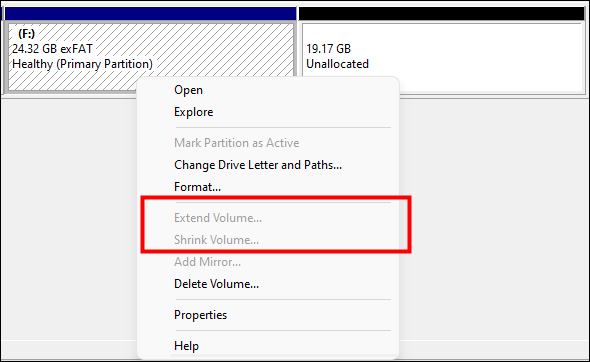How to Resize exFAT Partition (Extend/Shrink exFAT Volume)
Oliver updated on Mar 29, 2025 to Partition Manager | How-to Articles
Do you have trouble extending or shrinking an exFAT volume in Disk Management? Is the button greyed out? Do not worry! This page will show you how to resize the exFAT partition with ease.

ExFAT is primarily used for flash memory devices such as USB flash drives, and SD cards (especially SDXC and SDUC cards larger than 32 GB). However, many users are facing the problem that Windows Disk Management doesn't support resizing an exFAT partition. Neither you can extend it or shrink it since the options are greyed out for certain reasons.
But worry not. This page from EaseUS will offer you a practical and detailed guide on how to resize exFAT partition.
There are a few common reasons why the Extend and Shrink Volume is greyed out when you try to resize the exFAT partition:

Now that you have learned why you are unable to resize the exFAT partition, feel free to share this article and move on to find the solution.
Since Disk Management doesn't support resizing exFAT volume directly, the best option is to format it to NTFS and then resize it. To avoid other issues like unmovable files or non-adjacent unallocated space that might also prevent you from shrink or extend the exFAT partition, the best choice is to resort to EaseUS Partition Master.
As a reliable and powerful disk partition manager, EaseUS Partition Master allows users to resize the exFAT partition without Windows limitations. Now, let's learn how to resize an exFAT partition step by step.
If you have any important files on the exFAT partition, create a backup for them before further operation because the format process will delete all data on the drive. If not, you can skip stage 1 and go to the next part.
Due to Windows doesn't allow users to resize an exFAT volume, the first step is to format the exFAT partition to NTFS so that you can then shrink or extend it later as you wish.
Step 1. Run EaseUS Partition Master, right-click the hard drive partition you intend to format and choose "Format".
Step 2. In the new window, set the Partition label, File system (NTFS/FAT32/EXT2/EXT3/EXT4/exFAT), and Cluster size for the partition to be formatted, then click "OK".
Step 3. Then you will see a warning window, click "Yes" in it to continue.
Step 4. Click the "Execute 1 Task(s)" button to review the changes, then click "Apply" to start formatting the partition on your hard drive.
Now the partition is formatted to the NTFS file system, which is highly compatible with Windows, you can resize it using EaseUS Partition Master without obstacle.
Step 1: Locate and select the target drive/partition
Launch EaseUS Partition Master and go to Partition Manager, select the target drive or partition you need to adjust its size, right-click on it and choose "Resize/Move".
Step 2: Resize or move the partition
1.To shrink the partition, simply drag one of its ends to free up unallocated space. Once done, click "OK".
2. To extend the partition, make sure that there is unallocated space aside (if there isn't, follow the above steps to create some). In the same way, drag your mouse into the unallocated space. Click "OK".
3. To move a partition position, suppose you have created and left the unallocated space next to the target partition. If no, free up some unallocated space first.
Then, right-click the target partition, select "Reize/Move". Then drag the whole partition leftward or rightward to adjust its position. Click "OK" to confirm.
Step 3: Confirm the result and apply changes
At this step, you will see the new disk partition information & diagram.
To save changes, click the "Execute Task" button and then "Apply".
After the process, you can reformat it to exFAT and then restore all the data you just backed up if you have. Or, just keep it as NTFS for better compatibility and less hassle.
exFAT VS NTFS: What Are the Differences Between Them
This article discusses the differences between exFAT and NTFS file systems. If you want to know which is more suitable for your disk, this page will help. Read more >>
For users who are stuck in the process of resizing an exFAT partition, don't know how to shrink or extend it, and why the options are greyed out, this page offers an easy and safe way that can be helpul. It involves a reputable tool - EaseUS Partition Master. This tool can help you accomplish the whole procedure with its powerful features, saving you a lot of time and energy.
If you like this useful article, don't forget to share it with other users facing the same problem.
FAQs on How to Resize exFAT Partition
Related Articles
Quick Guide: Unlock Dell Laptop Without Password
How to Create and Format exFAT Partitions in Windows 11/10/8/7 (Free Methods)
How to Fix Windows 11 Error 0xc0000005? Answer Is Here!
How to Delete All Partitions on Windows 11